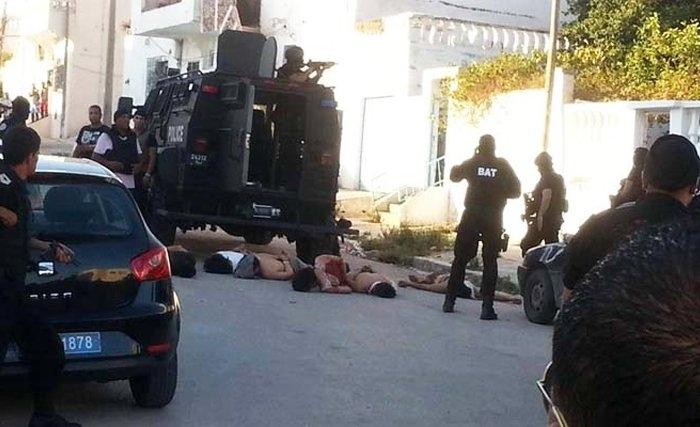Tunisia and the challenges of the battle for security
The system of crises (security, political, economic, social, religious and cultural) wearing down the State and the Tunisian social body, combined with the profound geopolitical upheavals restructuring the strategic neighborhood (Libya, Algeria and the depths of the Sahel) are boosting the rise in power of terrorism threatening Tunisian national security and likely to trigger a dynamic of violence and fragmentation capable of initiating a derailment of the still fragile democratic process.
In Tunisia, like a spider having had all the necessary latitude to weave its web, the entrenchment of terrorism has been accompanied by a double threat calling into question national unity and the very principle of the State. national:
The weakening of the state has caused a political regression that is expressed by the rise of tribal logic. The national integration effort undertaken after independence had succeeded in overcoming the traditional divisions of tribes and clans. This achievement has been undermined by particularist claims that national resources (phosphate in the mining basin) should benefit local populations. The disorders and revolts that broke out in the mining area openly raised this claim, materialized in particular by the taking hostage of the phosphate sector, a strategic production for the country. In the rest of the Maghreb-Sahelian region where there are individualized minorities (Amazigh, Tuaregs and Toubou), the problem arises as a structural factor in national integration and state building. Tunisia, despite these upheavals, is nevertheless distinguished in the regional picture by a strong and proven national unity. Nevertheless, the divisive electoral campaign led by President Marzouki has brought to light vulnerabilities and fault lines forgotten since independence and likely, through their instrumentalization by domestic or foreign forces, to constitute a serious danger to national security. ;
On the other hand, the democratic transition in Tunisia has revealed the existence of a minority which, denying the legitimacy of the territorial state, militates for the advent of the community state (Arab or Islamic). These small groups attack the symbols of the State, bring their declared support to the advent of an Emirate or the proclamation of an Islamic State such as Daesh. They constitute an internal force in support of jihadist theses. The contradictions and the double language of the party belonging to the Muslim Brotherhood will have to be removed with regard to their sectarian nature, their ideology and the multiple strategies that they have deployed following the same pattern, apart from tactical adjustments dictated by circumstances, since their creation in order to seize power in Egypt and within the Arab world. If the provincialist political threat remains surmountable by a strategy of economic and social development and regional balance, the communitarian threat constitutes a profound danger linked to international Islamist jihadism. The global approach must overcome all threats.
Resilient and mutating jihadist violence is the main security challenge for the newly elected authorities. Despite the blows dealt to it, its protagonists are constantly renewing the ranks of their fighters, adapting to internal and regional developments without changing their objectives and their ideological frame of reference. The multiplication of ambushes following the Algerian model targeting the armed forces and internal security and the spectacular Bardo attack of March 18, 2015 remind us to what extent the terrorist threat is rooted in Tunisian reality. This attack targeting the heart of Tunisian power, tourism, pillar of a Tunisian economy on the verge of asphyxiation and the Bardo Museum, symbol of Tunisia's plural identity, marks a major turning point. Through its mode of action and its unprecedented targets, it strikes at the heart of the young Tunisian democracy, updates its vulnerabilities and the entrenchment of a terrorist threat capable of targeting the capital and the heart of the institutions. The first government of the second republic must review its priorities and adopt the short and medium-term measures inherent in a State at war against the terrorist and criminal threat.
In addition to the essential economic, social, religious and cultural measures, the purely security battle will have to be waged on three fronts: assert without any weakness the authority of the State, radically repress terrorism, eradicate transnational organized crime. Organized crime, which has been known for more than 20 years, has grown disproportionately in the countries of the African Sahel (trafficking in cigarettes, cars, oil, drugs, weapons, human beings, etc.) and extended its network to Tunisia (oil , cigarettes, weapons, drugs, foodstuffs); it carries an insidious potential for destabilization. Terrorism and transnational organized crime proliferate thanks to the weakening of the State and jointly oppose a stronger capacity for resilience. Tunisia's security policy should be deployed along the following lines:
Refocusing the army on its core business, namely combat (defending national territory, securing borders, dealing with conventional threats and developing capabilities to combat asymmetric threats: terrorism, transnational organized crime, etc.). Study and initiate a gradual process of outsourcing certain functions (food, clothing, fleet management, etc.);

Establish the function of Joint Chief of Staff or Armed Forces (CEMA) overseeing the use of forces and commanding military operations. The chiefs of staff (land, sea, air) train and prepare the armed forces. This function must be institutionalized and the prerogatives of the Joint Chiefs of Staff clearly defined. He has authority over the Chiefs of Staff of the Army, Navy and Air Force as well as the directors and heads of the joint organizations attached to him. He has authority over the general staff; Reconstitute and develop the military reserve. All conscripts performing their national service must, without exception, be trained in the handling of arms and in combat (far too many, at this stage, are confined to related tasks, including base surveillance, etc.). The reserve must be reorganized according to the model of the forces, each one being able to be called at any time to join his post. In order to remain operational, on the Swiss model, a period of 15 days per year or every two years of return to the military establishment in order to carry out the necessary maneuvers and training could be instituted. Thus, gradually, an organized, effective and mobilizable reserve at any time could be constituted;
Abou Iyadh, leader of the terrorist organization Ansar al-Sharia, has constantly renewed his call for jihad in Syria and invited Tunisians to join the ranks of the new Caliphate. The latter represent, with an estimated number of 3,000 individuals, including more than 580 who have returned to Tunisia, the largest contingent in the world of jihadists engaged in Syria, far ahead of the Moroccans estimated at 1,500, the Algerians at 200 and the Libyans at 600 (total for the Maghreb of about 6000 individuals). The return of these radicalized, fanatical and combat-hardened jihadis represents the main threat to Tunisian national security, a threat likely to destabilize the country in the long term and hinder the process of democratic consolidation. Urgent measures must be put in place by the Tunisian authorities to detect these individuals, ensure the neutralization of the most radical and reintegrate and deradicalize the less extremist through a process of judicial, professional and medical supervision. Mosques, charities, websites, etc. must be subject to rigorous control in accordance with constitutional rights so as not to grant them a sounding board amplifying their capacity for nuisance (capacity to indoctrinate other Tunisians themselves once they return). With this in mind, the Tunisian authorities could:
Launch a national plan to prevent the radicalization of young people that can be extended to the countries of the Maghreb and the five countries of the Latin arc (plan within the framework of the 5+5 Dialogue);
Success in eradicating jihadist violence in Tunisia cannot be limited to strengthening technical-operational means and inter-service cooperation, but also presupposes a consensual attitude on the part of the various political currents around this objective, a de-ideologization of religious education and places of worship and finally a synergy of state services with civil society. This is the "politico-social" aspect of public action against armed extremism, neglected or rejected for too long both during the time of Ben Ali and under the government of the Troika, but which is inseparable from the strengthening and adaptation of the security tool.
Proposing the creation of a reception and de-radicalization structure capable of:
It would be good to appeal to the United Nations in order to obtain funding and set up this structure as a pilot experience within the Arab world. The fight against terrorism must be based on a coherent building. Cases relating to terrorism must escape the ordinary jurisdictions, the investigations having to be entrusted to highly specialized investigating magistrates or prosecutors. Under the 2003 anti-terrorism law, everything is centralized within the Tunis court of first instance. A significant gap remains: the lack of specialization of judicial actors not overcome by the creation of the new judicial center. Creating an anti-terrorism center within the Tunis court of first instance establishing the function of anti-terrorism investigating judge (4 judges on an indicative basis collaborating with the intelligence services and their foreign counterparts, etc.) would constitute a definite step forward. It goes without saying that the legislative framework and therefore the passing of an effective anti-terrorism law adapted to the new threat as a whole is an absolute priority. The procrastination of the former ANC assembly dominated by the Troika and the Nahdha party challenges;
The challenge posed by the development of jihadism, coupled with smuggling and arms and narcotics trafficking in the border regions requires the pooling of missions carried out by security apparatuses which, if they are to retain their specificity , are complementary. It is also necessary to strengthen the analytical capacities of the intelligence services and to restore a close security network in the national territory. At the same time, it is necessary to initiate an in-depth reform of the Tunisian security system, which involves the creation of a coordination structure in the fight against terrorism. To be effective, it must be based on a solid and legitimate political and institutional framework.
Coordination and intelligence are indeed at the heart of the fight against terrorism. Many shortcomings characterize the Tunisian system even as the country and the government declare war. This posture must materialize through the urgent adoption of concrete measures reflecting an irreversible leap forward. No procrastination, no failure, no slowness should be tolerated. In this sense, it would be appropriate to create within the Presidency of the Republic a National Coordination Council ensuring coordination between:
This National Coordination Council will meet at the request of the President of the Republic on a daily basis (in the event of a crisis) and on a weekly basis, bringing together the ministers concerned as needed (interior, defence, justice, foreign affairs, etc.) .
Reinforce the training and equipment of the special forces (no under-employment) and constitute a strategic tool. It is a question of creating a close link between strategic intelligence and valued special forces, trained in the latest combat doctrines, equipped with the most modern means in terms of armament and projection capabilities, etc. the objective being to imperatively shorten the time of action (the chain of command) between the identification of a threat and its treatment by these special forces;
Launch neighborhood-by-district encirclement and combing operations in towns close to terrorist hotbeds and large agglomerations offering refuge to these malevolent elements and harboring sleeper cells. The staggering effect must operate and our forces must regain the initiative;
Rehabilitate human intelligence and articulate it with Tunisian and foreign technological intelligence. One without the other produces only limited results;
The fight against terrorism will be a long-term one. It cannot win without “winning hearts and minds” (the basic concept of counterinsurgency warfare). A population hostile to the forces leading the fight against terrorism is a major handicap, almost insurmountable. At this stage, the connection is established between the imperious need for urgent economic and social measures in order to break the link between an idle population and terrorists or criminals in a position, given their financial capacities and the fear that they inspire, to buy their complicity. The concept of the economy of the fight against terrorism will have to be theorized and valued;
With this in mind, work to cultivate the resilience of civil society, institutions and the armed and security forces. The ability to absorb shocks and bounce back will be central to the long-term fight against terrorism. In accordance with the thought of the famous Japanese monk Takuan Soho (1573-1645), it is a question of adapting the philosophy of Zen to the practice of the sword: the spirit must be sufficiently calm and mobile to act with accuracy and precision in all situation;
Based on the articulation of the three plans in the analysis of terrorism in Tunisia, geopolitical monitoring of the rapid and brutal developments in our strategic Maghreb-Sahelian neighborhood and the Middle Eastern scene is essential.
Creating a National Observatory of Crises and Terrorism focused on geopolitical analysis and on anticipating the evolution of terrorism and threats likely to strike Tunisia and threaten democratic transition and national security in imperative. It is a question of no longer suffering and of reacting urgently by highlighting a pro-active attitude. alert, monitoring and anticipation of geopolitical developments, crises and conflicts on a regional and international scale and terrorist and criminal threats. It will operate according to a geographical division. In an international and regional environment marked by growing uncertainty, the identification, analysis and assessment of crisis situations and threats constitute an essential tool for governance and the prevention of crises likely to destabilize Tunisia. The President of the Republic must be able to have access to all the relevant data and the tools to clarify the decision. In this sense, a permanent monitoring, alert and anticipation capacity through the construction of prospective dashboards must be implemented. It is a question of significantly strengthening the evaluation and anticipation capacities of the authorities. In this sense, the mission could be summarized in these terms: Evaluate and analyze (understand); Anticipate ; To propose. Urgency should not overshadow reflection and consideration of strategic surprises. On the contrary, the anticipation, the identification of what the Americans call "wildcards" (which, although apparently improbable, would be the most dangerous), the attitude based, according to a former president of General Electric, on the principle of "destroy your own business" must prevail because it allows better action and optimization of the fight against terrorism today and not tomorrow. Thus, to think about the future is to shed light on present action.
In the context of a growing terrorist threat, the hazards and uncertainties inherent in maintaining order and safeguarding the integrity of the State can directly or indirectly affect national security. In this sense, preventive action acquires a central dimension. It will be a question of being able to anticipate situations that we can qualify as “security alert threshold situations”.
The functioning and performance of the armed and security forces are part of a representation of the field of threats not just of the past or present but also of the future. A State must be able to control the future challenges of its defense policy and the resulting needs in order to fully play its role in maintaining the major internal balances. The volatility and diversity of threats that can weigh significantly on the national security dictate that leaders be made aware of the need to take the future into account in their processes for evaluating, diagnosing and dealing with proven or potential sources of threat.
In this context, foresight aims to "add boxes in national territory defense strategies". Thinking about the future means preparing for action, forging a strategy for investigating the future (being able to mark it out) leading to an operational tool for strategic decision-making.
Tunis, April 16, 2015Mehdi TajeGeopolitician and prospectivist, specialist in the Maghreb and the SahelDirector of Global Prospect Intelligence



![PAU - [ Altern@tives-P@loises ] PAU - [ Altern@tives-P@loises ]](http://website-google-hk.oss-cn-hongkong.aliyuncs.com/drawing/179/2022-3-2/21584.jpeg)

![Good deal: 15% bonus credit on App Store cards of €25 and more [completed] 🆕 | iGeneration Good deal: 15% bonus credit on App Store cards of €25 and more [completed] 🆕 | iGeneration](http://website-google-hk.oss-cn-hongkong.aliyuncs.com/drawing/179/2022-3-2/21870.jpeg)





Related Articles